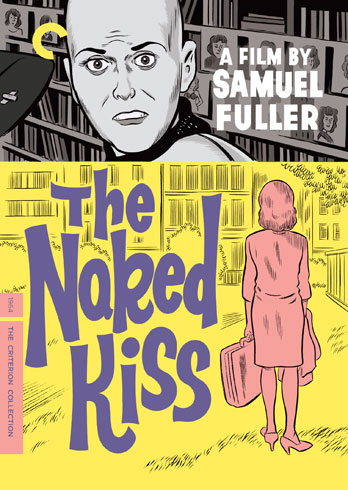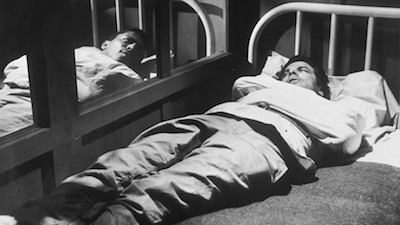
It's hard to believe I'm only been about three months since I got my Blu-Ray player. I definitely jumped in with both feet, even if I'm trying to be cautious about going overboard with upgrading my entire collection. I'm a boy on a budget, after all.
So, when I say that the new Criterion reissues of their Samuel Fuller titles, Shock Corridor and The Naked Kiss, are absolutely worth it, you can trust that this is something I mean wholeheartedly. Even if you aren't partaking of the new format yet, judging by the new transfers and all-around quality of the packaging, I am sure the standard DVD re-releases are also worth the cash. Being #18 and #19 in terms of spine numbers means both of these films were pretty early in the catalogue's existence. The original release date of the first barebones editions was 1998. Grand strides have been made in the art of film restoration, and you can see the journey in every cleaned-up frame. Both movies look astonishing. The pristine high-definition transfers are free of blemish, and they show the balanced black-and-white photography as never before. Given how much these flicks have been kicked around through the years, with various dubious DVD releases, it's wonderful to have definitive releases that get them exactly right.

I reviewed both of the Fuller movies not that long ago, prior to the announcement of these upgrades. It hasn't been quite enough time for me to develop profound new insights into the films, so you can read those reviews in the archives (Shock Corridor here, The Naked Kiss here). That doesn't mean there isn't plenty to talk about here. These releases are more than just new transfers, but a full overhaul. You can tell that right away when you see the spiffy new covers. Comics artist Daniel Clowes, perhaps best known in film circles as the author of the original Ghost World

Criterion has also added several bonus features that make these Blu-Rays worth the price of admission. I'm particularly excited to report that Shock Corridor now comes with the 1996 documentary The Typewriter, the Rifle and the Movie Camera, a 55-minute profile of Fuller directed by Adam Simon and featuring commentary by Tim Robbins, Martin Scorsese, Jim Jarmusch, and Quentin Tarantino. I first saw this documentary on IFC back in the 1990s, before I had seen most of Fuller's films, if in fact I had seen any. It gave me a long list of movies to seek out, some of which I am still looking for. (Hey, China Gate is on Netflix Instant!) Now that I've seen a good selection of them, it's all the more effective when Robbins and Tarantino go into Fuller's storage garage and sift through his memorabilia; now I actually know what it is they are finding!
More invigorating, though, is the footage of Fuller talking. What a raconteur this guy was! The title refers to his three careers: reporter, soldier (Fuller fought in WWII), and filmmaker. Each phase is covered, all brought to life by Fuller's vivid anecdotes. As Scorsese points out, Fuller tells stories the same way he makes films--there is no difference between what comes out of his mouth and what he puts on the screen. If you like how Sam makes movies, you'll love listening to him. (Side note: Too bad Criterion couldn't also resurrect Tigrero

The bulk of the supplements on The Naked Kiss seize on the concept of Fuller as storyteller and run with it. Three different archival television programs are almost entirely single-camera jobs. Fuller is interviewed in all of them, but they are really more like monologues. The earliest is a 1967 episode of the French television show Cinéastes de notre temps, and it's nearly half-an-hour of vintage Sam. Flanked by the Eiffel Tower, the director lays out a lot of his technique and what excites him about motion pictures. One explanation of a particularly complicated set-up will have you rushing to your Pick-Up On South Street discs to see what he is talking about. [review]
Another French program is a short segment from Cinéma cinemas. Shot in 1987, it's simply Fuller going through a collection of famous photographs and talking about what he remembers. Some pre-date his movie career, including pictures from his wartime service, and others come from the publicity archives of many of his films. His life and history is also a good part of the 1983 episode of The South Bank Show, a BBC program that devoted an installment to the director. About half-an-hour of the full episode is excerpted here. Most of it, again, is Sam, but there is a small portion with Wim Wenders sharing his thoughts about Fuller.

Both BDs also have the original theatrical trailers, and each has nearly half-an-hour of a 2007 interview with actress Constance Towers, who was in both Shock Corridor and The Naked Kiss. She talks in-depth (nearly half an hour on each) about working with Sam and his balls-out production process, and the segments are specific to their particular disc. The interview on The Naked Kiss also includes her sharing more about her background. The story of the girl from Whitefish, Montana, making it in film is a classic Hollywood tale unto itself.
I'm a big Samuel Fuller fan, so these new releases would have likely been a must-have regardless, but seeing as how the Criterion Collection has gone all out in terms of improving them, it's a double-dip I have no residual qualms for indulging in.

Also out this month on Blu-Ray, and alas another film I covered last year, is Byron Haskin's Robinson Crusoe on Mars [original review]. Released in 1964 (the same year as The Naked Kiss), it's a Technicolor wonder--one that definitely seems more charming on second viewing. That could be down to the stunning presentation, I don't know. The original Criterion disc, released just over three years ago, was no slouch in the technical department, but the Blu-Ray shows just how dazzling a movie like this one can be in high-definition.
Though the unschooled might have previously had occasion to sniff at the special effects as being simplistic compared to the complicated pixel-by-pixel build-ups we get today, seeing Robinson Crusoe on Mars in this capacity would shut just about anyone up. The colors are remarkably vibrant, and the added clarity allows every tiny detail to be seen like never before. You'd have to be a hardcore cynic not to be awed by how incredibly complete Haskin's invented world is. The suits, the gadgets, the rockets, even the surface of the red planet--this is a craftsmen's delight. Even if, like me, you weren't immediately in love with Robinson Crusoe on Mars the first time around, the Blu-Ray warrants a second look.
For those wondering, the supplements on this edition are exactly the same as on the standard DVD, as is the packaging. The excellent Bill Sienkiewicz artwork is still intact. It's another thing all of these reissues have in common besides their original theatrical release dates: comic book illustrations. They are movies that capture the imagination, even if they do so in totally different, nearly opposite ways, and capturing the imagination is something a good comic artist knows a thing two about him or herself.
The Naked Kiss and Robinson Crusoe on Mars were provided by the Criterion Collection for purposes of review. Shock Corridor was reviewed in conjunction with DVD Talk, and you can read the full article here.

No comments:
Post a Comment